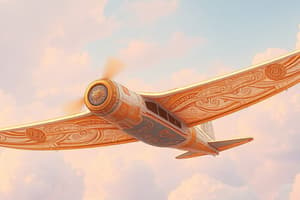Podcast
Questions and Answers
What does dynamic stability primarily deal with?
What does dynamic stability primarily deal with?
- The aircraft's immediate response to forces
- The time history of motion after initial response (correct)
- The aircraft's center of gravity
- The static forces acting on the aircraft
What type of motion does the y-axis in the aircraft coordinate system represent?
What type of motion does the y-axis in the aircraft coordinate system represent?
- Roll
- Yaw
- Pitch (correct)
- Vertical Motion
What is the primary effect of aileron deflection in aircraft?
What is the primary effect of aileron deflection in aircraft?
- It controls yaw motion
- It modifies the center of gravity
- It stabilizes the pitch axis
- It initiates roll motion (correct)
Which of the following terms describes the stability of an aircraft that returns to its original position after a disturbance?
Which of the following terms describes the stability of an aircraft that returns to its original position after a disturbance?
In terms of directional stability, what does asymmetrical power in an aircraft typically affect?
In terms of directional stability, what does asymmetrical power in an aircraft typically affect?
What characteristic of a wing contributes to its directional stability?
What characteristic of a wing contributes to its directional stability?
What is the difference between static and dynamic stability?
What is the difference between static and dynamic stability?
What type of wing configuration is referred to as 'anhedral'?
What type of wing configuration is referred to as 'anhedral'?
What motion is associated with the x-axis in the aircraft coordinate system?
What motion is associated with the x-axis in the aircraft coordinate system?
Which type of stability indicates that an aircraft will return to its original position after being disturbed?
Which type of stability indicates that an aircraft will return to its original position after being disturbed?
Which of the following best describes dynamic stability in an aircraft?
Which of the following best describes dynamic stability in an aircraft?
Which wing configuration is characterized by a downward angle from the horizontal?
Which wing configuration is characterized by a downward angle from the horizontal?
Which axis in the aircraft coordinate system is primarily associated with the motion of yaw?
Which axis in the aircraft coordinate system is primarily associated with the motion of yaw?
What effect does the deflection of the elevator primarily have on an aircraft?
What effect does the deflection of the elevator primarily have on an aircraft?
In the context of directional stability, what role does the dihedral angle play?
In the context of directional stability, what role does the dihedral angle play?
How does asymmetric power affect an aircraft's directional stability?
How does asymmetric power affect an aircraft's directional stability?
What defines positive static stability in an aircraft?
What defines positive static stability in an aircraft?
Which characteristic is associated with dynamic stability?
Which characteristic is associated with dynamic stability?
How does a dihedral angle influence an aircraft's stability?
How does a dihedral angle influence an aircraft's stability?
Which statement best describes static stability?
Which statement best describes static stability?
In terms of aircraft dynamics, what is the purpose of a rudder's deflection?
In terms of aircraft dynamics, what is the purpose of a rudder's deflection?
Which statement accurately describes asymmetric power concerning directional stability?
Which statement accurately describes asymmetric power concerning directional stability?
What does the term 'anhedral' refer to in wing design?
What does the term 'anhedral' refer to in wing design?
Which of the following describes dynamic stability?
Which of the following describes dynamic stability?
What does the lateral axis in the aircraft coordinate system represent?
What does the lateral axis in the aircraft coordinate system represent?
Which factor primarily determines the directional stability of an aircraft?
Which factor primarily determines the directional stability of an aircraft?
How does an aircraft with positive static stability behave after a disturbance?
How does an aircraft with positive static stability behave after a disturbance?
In the context of stability, what does 'dihedral' refer to?
In the context of stability, what does 'dihedral' refer to?
Which statement accurately describes static stability?
Which statement accurately describes static stability?
What is the role of the elevator in aircraft stability?
What is the role of the elevator in aircraft stability?
How does asymmetric power affect an aircraft's flight dynamics?
How does asymmetric power affect an aircraft's flight dynamics?
Flashcards
Aircraft Stability
Aircraft Stability
The tendency of an aircraft to return to its original position after being disturbed.
Static Stability
Static Stability
A type of stability where the aircraft returns to its original position after a disturbance without oscillating.
Dynamic Stability
Dynamic Stability
A type of stability where the aircraft returns to its original position after a disturbance with oscillations that dampen over time.
Directional Stability
Directional Stability
Signup and view all the flashcards
Dihedral Angle
Dihedral Angle
Signup and view all the flashcards
Dihedral
Dihedral
Signup and view all the flashcards
Anhedral
Anhedral
Signup and view all the flashcards
Sweptback Wings
Sweptback Wings
Signup and view all the flashcards
Study Notes
Flight Stability and Dynamics
- Flight stability is an aircraft's ability to return to its original flight condition after a disturbance, without pilot intervention.
- Stability can be static or dynamic.
- Static stability describes the initial tendency of the aircraft to return to equilibrium.
- Dynamic stability describes the time it takes for the aircraft to respond to the initial displacement, as well as the oscillation and damping of the aircraft as it returns to equilibrium.
- Three types of static stability exist: positive, negative, and neutral.
- Positive static stability means the aircraft tends to return to its original attitude after a disturbance.
- Negative static stability means the aircraft moves further away from its original attitude after a disturbance.
- Neutral static stability means the aircraft neither returns to nor moves further from its original attitude after a disturbance.
- An aircraft can have positive static stability but negative or neutral dynamic stability.
- Three axes are used to describe flight movements: longitudinal, lateral and vertical.
- Longitudinal axis runs from nose to tail, and rotational movement around this axis is known as rolling.
- Lateral axis is perpendicular to the longitudinal axis, and rotational movement in this axis refers to pitching.
- Vertical axis is perpendicular to the other two, and rotation along this axis is called yawing.
- The centre of gravity (CG) is the common reference point for these axes.
- Stability about the longitudinal axis is called longitudinal stability.
- The lateral stability is determined by the dihedral angle of the wings.
- The dihedral angle is the acute angle between the wing and the lateral axis.
- Anhedral is the opposite of dihedral, and involves a downward angle between wing and axis.
- Anhedral is commonly used in high mounted swept wings.
- Torque effect dictates the aircraft will tend to rotate in the opposite plane to the propeller, and this is often countered using washout and washin. Washout refers to decreased angles of incidence on one wing, and wash-in is the opposite.
- Ground effect occurs when an aircraft is close to the ground, reducing stalling speed through airflow interactions. Several factors impact ground effect, including wing area, height above the ground, and wing loading.
- Dutch roll defines the combined effects of rolling and yawing that result in an oscillatory movement. This movement can become unstable.
- Aircraft can be statically stable but have no active measures for dynamic stability.
- Modern high-speed, high-altitude aircraft are typically aerodynamically unstable and rely on active control systems for stability. These systems use digital controls to maintain stability. Yaw dampers are sometimes used to regulate dutch roll.
- Spiral instability happens when the vertical fin's effect is greater than dihedral, causing the plane to spiral.
- Dihedral is the acute angle between a wing and the lateral axis, used for lateral stability.
- Anhedral is when the wings are angled downward to counteract dutch roll.
- Longitudinal dihedral is the angle between the horizontal stabilizer and the wings.
- Static and dynamic stability have different characteristics, with dynamic stability dealing with the response and oscillations of an aircraft after an initial displacement from equilibrium.
Additional notes
- Aircraft stability is often described in relation to specific axes of rotation (longitudinal, lateral, and vertical), and the characteristics of each axis.
- Various factors contribute to stability, such as wing design (dihedral, anhedral), the location of the center of gravity (CG), and the design of control surfaces.
- The design of an aircraft can include features to counteract torque effects.
- The presence of ground effect and its resulting effects on stalling speed is a factor in aircraft design and operation.
- There are different types of stability, including positive, negative, and neutral for both static and dynamic situations.
- The response of an aircraft to disturbances following an initial displacement is an aspect of dynamic stability.
Studying That Suits You
Use AI to generate personalized quizzes and flashcards to suit your learning preferences.




